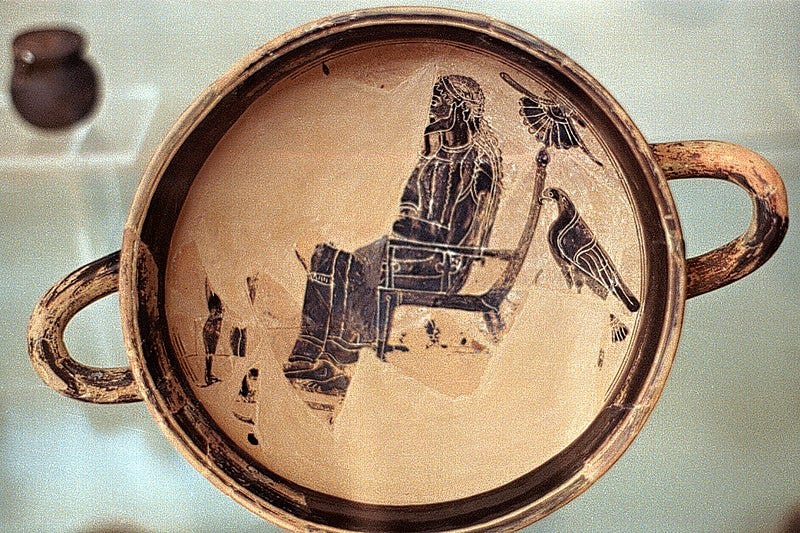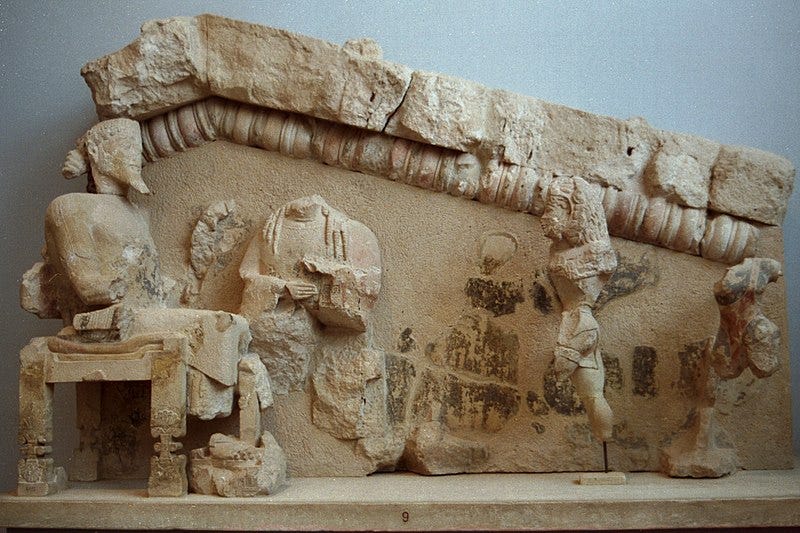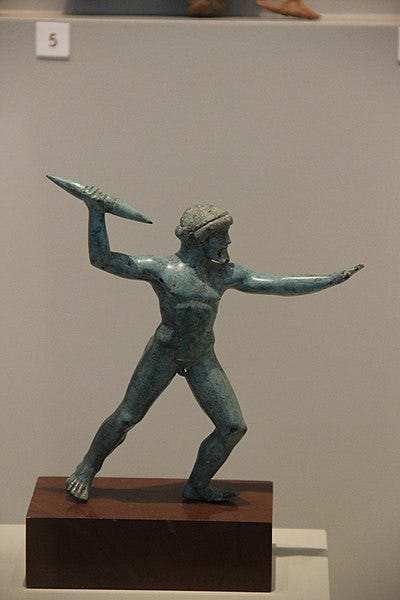This post is a basic introduction to reading Iliad 20. Here is a link to the overview of Iliad 19and another to the plan in general. As a reminder, these posts will remain free, but there is an option to be a financial supporter. All proceeds from the substack are donated to classics adjacent non-profits on a monthly basis.
Book 20 is both about ending end extending various layers of suspense that have drawn the epic’s plot taut since the beginning: it finally sees Achilles’ return to battle (postponed since book 1 and since the death of Patroklos in book 6) and also the initiation of redirecting his rage towards Hektor. In the local context of the epic’s final third, it also ends the waiting that commenced at the beginning of book 18 when the news of Patroklos’ demise found Achilles. However, this book also pulls out all the stops to delay the consummation of Achilles’ rage in the death of Hektor, an event foretold by Zeus himself in book 15. Zeus starts this book with a divine assembly, authorizing the gods to intervene in the battle as they will and features as a central episode the match-up of Aeneas and Achilles. The former almost dies but is rescued by Poseidon. Just as Achilles is about to meet Hektor, Apollo delays their meeting and Achilles slaughters indiscriminately.
Books 20 and 21 are really a complementary pair moving Achilles and the audience through various heroic battle motifs: The first book matches him against another famous heroic tradition while the second is more defuse, taking Achilles out of the more familiar into the realm of theomachy. Each of these movements adds something to the themes I have outlined in reading the Iliad: (1) Politics, (2) Heroism; (3) Gods and Humans; (4) Family & Friends; (5) Narrative Traditions. Among these, however, I think book 20 speaks most directly to narrative traditions, Gods and humans, and heroism.

Zeus’ speech to open book 20 redraws the boundaries for the gods on the field. It reverses his earlier prohibition against divine interference in books 4, 8 and 15, and intentionally sends the gods to delay Achilles’ advance. In addition to manipulating the plot, as Zeus does earlier, this passage also has some curious reflections on divine interest in human beings and the limits of fate.
Homer, Iliad 20.13-30
“So they were gathered in Zeus’ home. Not even the earth-shaker
Disobeyed the goddess’s summons. But he came from the sea
And sat among them in the middle. He asked about Zeus’ plan
“Why have you called us to assembly, god of lightning?
Are you really contemplating something about the Trojans and Achaeans?
Now the battle and the war ranges closest between them.”
In answering, cloud-gathering Zeus addressed him.
“Earth-shaker, you know the plan in my thoughts, the reasons why
I have gathered you. These people concern me, even though they are about to die.
So I will remain here myself, seated on the ridge of Olympos,
This place from where I will take some pleasure watching. But the rest of you
Go until you arrive among the Trojans and the Achaeans
And help both sides in whatever way your mind inclines.
For if Achilles fights alone against the Trojans,
Well, they will not withstand the swift-footed son of Peleus for long.
Even before they used to shrink back in fear when they saw him—
And now when his heart is awfully enraged over his friend,
I fear that he will breach the wall beyond what is fated.”῝Ως οἳ μὲν Διὸς ἔνδον ἀγηγέρατ’· οὐδ’ ἐνοσίχθων
νηκούστησε θεᾶς, ἀλλ’ ἐξ ἁλὸς ἦλθε μετ’ αὐτούς,
ἷζε δ’ ἄρ’ ἐν μέσσοισι, Διὸς δ’ ἐξείρετο βουλήν·
τίπτ’ αὖτ’ ἀργικέραυνε θεοὺς ἀγορὴν δὲ κάλεσσας;
ἦ τι περὶ Τρώων καὶ ᾿Αχαιῶν μερμηρίζεις;
τῶν γὰρ νῦν ἄγχιστα μάχη πόλεμός τε δέδηε.
Τὸν δ’ ἀπαμειβόμενος προσέφη νεφεληγερέτα Ζεύς·
ἔγνως ἐννοσίγαιε ἐμὴν ἐν στήθεσι βουλὴν
ὧν ἕνεκα ξυνάγειρα· μέλουσί μοι ὀλλύμενοί περ.
ἀλλ’ ἤτοι μὲν ἐγὼ μενέω πτυχὶ Οὐλύμποιο
ἥμενος, ἔνθ’ ὁρόων φρένα τέρψομαι· οἳ δὲ δὴ ἄλλοι
ἔρχεσθ’ ὄφρ’ ἂν ἵκησθε μετὰ Τρῶας καὶ ᾿Αχαιούς,
ἀμφοτέροισι δ’ ἀρήγεθ’ ὅπῃ νόος ἐστὶν ἑκάστου.
εἰ γὰρ ᾿Αχιλλεὺς οἶος ἐπὶ Τρώεσσι μαχεῖται
οὐδὲ μίνυνθ’ ἕξουσι ποδώκεα Πηλεΐωνα.
καὶ δέ τί μιν καὶ πρόσθεν ὑποτρομέεσκον ὁρῶντες·
νῦν δ’ ὅτε δὴ καὶ θυμὸν ἑταίρου χώεται αἰνῶς
δείδω μὴ καὶ τεῖχος ὑπέρμορον ἐξαλαπάξῃ.
A few things jump out at me from this exchange. First, notice the change in Poseidon as a character. Where he was much more of an active participant in book 13 and a complainant of sort in books 7 and 15, here he is less of an agent and more of a mere character. Of course, this changes almost as soon as he enters the fray. Up to that point, however, he arrives here as something of a secondary internal audience. By this I mean he asks the very question that the external audience may be asking: what exactly is the plan for the rest of the epic? Zeus is shifting from an internal audience guiding our viewing in book 19, to an author of the narrative for a brief moment, before he recedes again to watch the action unfold. When Poseidon asks him what is going to happen, he elicits a response that helps to shape the narrative to come and provide more information.
The language used in this passage may recall the opening of the poem (“the proem”). At the very least the repeated invocation of “the plan” (βουλήν x2;) plus the mention of people dying (ὀλλύμενοί) echo the opening concerns of the proem that make it clear that Achilles’ rage is killing myriad Achaeans as part of Zeus’ plan. ‘Re-tuning’ is appropriate here especially because Achilles’ anger is specifically invoked as not just in action but in danger of subverting the action away from where Zeus wants it to go.
This danger of subverting Zeus’ will brings me to the second point I find interesting in Zeus’ speech. When Zeus says “they are a concern to me even though they are dying”, many interpreters have taken to mean that it is because he cares about people. (Indeed, the scholia assume that this is part of his role as the “father of men and gods”). But what this concern really means is unclear. I think that μέλουσί μοι ὀλλύμενοί περ not a concern because of sympathy for their fates—all men die and Zeus seems more or less ok with myriad deaths—but because of the danger it may represent to his plans, as Bill Beck persuasively argues, and the course of fate in the larger Trojan war narrative.
This connects in part to a third aspect of this speech that is important, which is the final concern Zeus expresses, that Achilles’ rage is such that it might result in actions that are “beyond fate” (ὑπέρμορον) points both to Achilles’ actions in general and may anticipate the subsequent endangerment and rescue of Aeneas. Although there is some debate in the textual tradition about this phrase—others have suggested that the correct reading is ὑπέρβιον, “super violently”—it seems sound to me that Zeus would use this phrase here: his concern is with any action that may disrupt the basic facts of the Trojan War narrative as they have to be. Achilles cannot enter Troy because everyone knows that he will die outside of it.
Other events that were labeled as “beyond fate” include the Achaean return home in book 2 (which would have ended the war), the breaching of the walls in 21.517, human beings suffering beyond their measure because of stupidity (Od. 1.34), Aigisthus marrying Klytemnestra (Od. 1.35), or Odysseus dying without getting home (Od. 5.436). Of these, the Aigisthus case is the hardest, but according to Zeus he was warned by Hermes not to do what he did. So, in all these cases, the phrase huper moron seems to indicate a transgression against the outline of a story or the rules of a story as they have been articulated.
David Konstan suggests that “As the internal spectator, Zeus’ delight cues the audience as to how the scene is to be appreciated: this is for fun, not serious like the mortal conflict” (2015, 10) And, in part, Pietro Pucci supports this when he draws attention to Hera and Athena “delighting” in the conflict in book 4. As Pucci writes, “terpein is also the verb for the enjoyment derived from poetry, and it resonates even in the name of the Odyssean bard Phemius Terpsiades” (23). When it comes to the passage in book 24, Pucci notes a common reading: “Critics have tried to reduce Zeus’s cynicism by an appropriate reading: it has been suggested that he is getting pleasure mainly from watching the fighting gods, as is stated explicitly at 21.388–90, and it has been noted that Zeus in our passage at line 21 says: “I am concerned with them, though they perish.” Pucci goes on to argue that the pleasure in part derives from the completion of Zeus’ plan to end the race of heroes.
I think there may be more to this, however. In the Odyssey we find an interesting relationship between pleasure and grief and storytelling. In book 19, Penelope describes herself as spending her days taking pleasure in mourning (ἤματα μὲν γὰρ τέρπομ’ ὀδυρομένη γοόωσα, 19.513) and she and Odysseus take pleasure in telling each other stories (τερπέσθην μύθοισι, πρὸς ἀλλήλους ἐνέποντες, 23.301). While Eumaios invites Odysseus to take pleasure in telling each other their past tales (Od. 15.398–401):
“Let us take pleasure in calling to mind each other’s terrible pains
while we drink and dine in my home.
For a man may even find pleasure among pains
when he has suffered many and gone through much.”νῶϊ δ’ ἐνὶ κλισίῃ πίνοντέ τε δαινυμένω τε
κήδεσιν ἀλλήλων τερπώμεθα λευγαλέοισι
μνωομένω· μετὰ γάρ τε καὶ ἄλγεσι τέρπεται ἀνήρ,
ὅς τις δὴ μάλα πολλὰ πάθῃ καὶ πόλλ’ ἐπαληθῇ
As I argue in my book on the Odyssey, The Many Minded Man, this pleasure comes from knowing a tale has ended, from resolving the suspense, and finding the end of something the way we often cannot in real life (2020, 247-249). In book 19, the Achaean kings try to get Achilles to feel some pleasure, but they fail (19.312-313) and I think it is because he is torn between what he needs to do (wait), what he wants to do (kill Hektor), and the impossibility of these actions addressing his real pain. Here, I think we can imagine that Zeus takes pleasure in the narrative unfolding because he is moving it toward a definitive end, he knows what that end is, and it is a fulfillment of the plan he has had all along. If we, as the external audience watching Zeus watching the action feel pleasure too, it may be from the poem reaching its long anticipated denouement, even as it may also have to do with the vicarious experience of violence, death, and release.
Some reading Questions for Book 20
What does the confrontation between Achilles and Aeneas add to our understanding of the Iliad?
Why does Zeus let the gods run wild in book 20?
How does book 20 anticipate the battle between Achilles and Hektor?

A Short Bibliography for Iliad 20
Ballesteros, Bernardo. “On « Gilgamesh » and Homer: Ishtar, Aphrodite and the meaning of a parallel.” Classical Quarterly, N. S., vol. 71, no. 1, 2021, pp. 1-21. Doi: 10.1017/S0009838821000513
Beck, Bill. “Harshing Zeus’ μέλω: reassessing the sympathy of Zeus at Iliad 20.21.” American Journal of Philology, vol. 143, no. 3, 2022, pp. 359-384. Doi: 10.1353/ajp.2022.0015
Cramer, David. “The wrath of Aeneas: Iliad 13.455-67 and 20.75-352.” Syllecta classica, vol. 11, 2000, pp. 16-33.
Fenno, Jonathan Brian. “The wrath and vengeance of swift-footed Aeneas in Iliad 13.” Phoenix, vol. 62, no. 1-2, 2008, pp. 145-161.
Hesk, Jon. “Homeric flyting and how to read it: performance and intratext in Iliad 20.83-109 and 20.178-258.” Ramus, vol. 35, no. 1, 2006, pp. 4-28.
Konstan, David. “Homer answers his critics.” Electryone, vol. 3, no. 1, 2015, pp. 1-11.
Pucci, Pietro. “Theology and poetics in the « Iliad ».” Arethusa, vol. 35, no. 1, 2002, pp. 17-34.
Reece, Steve Taylor. “σῶκος ἐριούνιος Ἑρμῆς (Iliad 20. 72): the modification of a traditional formula.” Glotta, vol. 75, no. 1-2, 1999, pp. 85-106.
Smit, Daan W.. “Achilles, Aeneas and the Hittites : a Hittite model for Iliad XX, 191-194 ?.” Talanta , vol. XX-XXI, 1988-1989, pp. 53-64.
Wakimoto, Yuka. “Aeneas in and before the « Iliad ».” Journal of Classical Studies, vol. 45, 1997, pp. 28-39.




